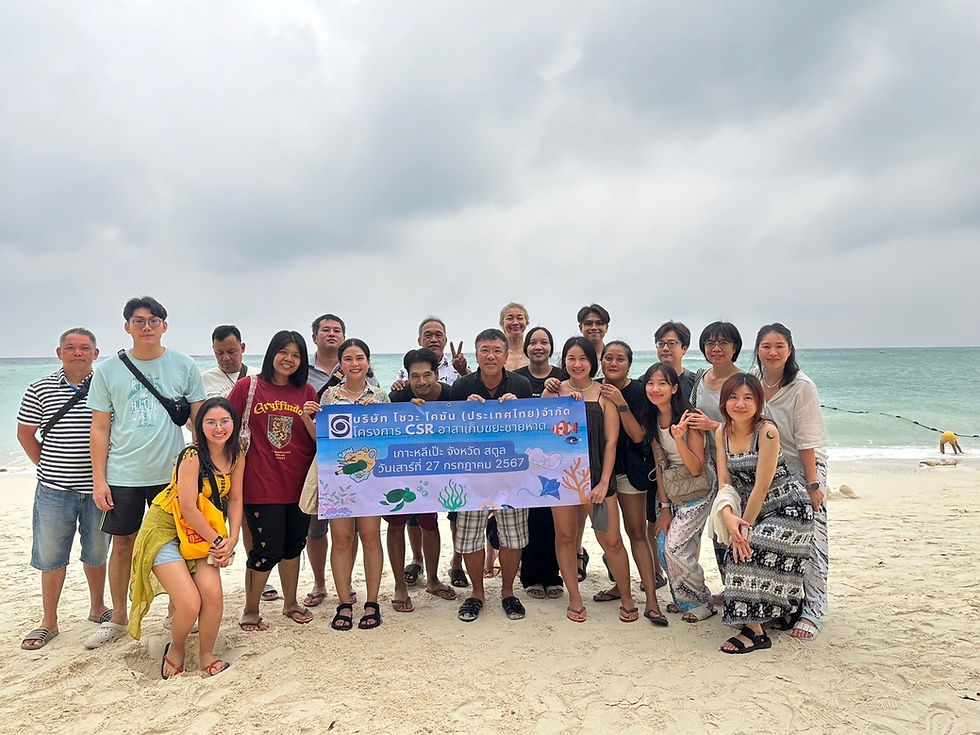Producing Battery Components from Rice Husks
- ysasaki69
- Nov 2, 2023
- 3 min read
Updated: Nov 8, 2023
THE DAILY NNA published an article that Showa Kosan is promoting the commercialization of technology to produce negative electrode material, one of the main components of automotive batteries, from rice husks.
We have already launched shipping samples to local lithium-ion battery manufacturers.
The details of the article can be viewed at the following link.
【Article】
KKU VOLTS, a startup founded by the national Khon Kaen University in the northeast and two Thai companies, is producing nanosilicon for anode materials using silica extracted from rice husks as a raw material, as well as graphite, a conventional anode material, with the nanosilicon. We have succeeded in establishing a technology to manufacture a silicon carbon composite (Si-C) negative electrode material blended with (graphite).
In the battery industry, in an effort to increase the capacity of lithium-ion batteries, silicon-based materials, which have a higher theoretical capacity than graphite, are currently attracting attention as next-generation negative electrode materials.
Khon Kaen University originally had the technology to extract silica from rice husks and purify nanosilicon. Furthermore, there are technologies that can process silica and silicon into nano-sized particles (nano is one-billionth) suitable for negative electrode materials.
Depending on the output of an in-vehicle battery, the appropriate electrode material will also change. Khon Kaen University also has the know-how to match nanosilicon to the specifications required by customers by blending it with graphite in the appropriate proportions.
〇The production line is close to the customer
Samples of "rice husk negative electrode material" for customers are produced on a line in the laboratory at Khon Kaen University. Thailand's automotive battery industry is in its infancy. ``Currently, he is in the midst of breaking down what kind of battery is needed for what kind of field, and what kind of components are needed for that purpose,'' said Yamada, managing director.
Showa Kosan (Thailand) has approached several local battery manufacturers in Thailand. Rice husk negative electrode material is currently being considered for adoption as one of several candidates by local battery manufacturers.
Once a formal hiring decision is made, Managing Director Yamada would like to set up a production line near the customer's factory to facilitate supply. The line he plans to build is KKU VOLTS.
Unlike graphite, which has an overwhelming share in China, rice, the raw material, is produced all over Thailand, so we will take advantage of the fact that it can be easily procured basically anywhere. The annual rice production of Thailand, which is an agricultural powerhouse, is about 18 million tons, and a large amount of rice husk is produced. Generally speaking, the ratio of rice husks to rice is said to be around 20%.
In Thailand, rice husks are now increasingly being used as biomass (biological resources). Assuming that an efficient route for collecting rice husks is established and all of the rice husks are used as negative electrode material, a simple calculation shows that Thailand could supply 24,000 gigawatt hours of lithium-ion batteries annually. This means that it is possible to produce negative electrode materials that can
At this stage, there are no rival companies with technology similar to KKU VOLTS. Showa Kosan (Thailand) plans to officially hire him by 2025 or 2026, and hopes to increase profits. If there are more opportunities to use rice husks to manufacture high-value-added negative electrode materials, it is expected to lead to higher incomes for farmers. This project will also contribute to the realization of the BCG (Bio, Circular, Green) economy promoted by the Thai government.
The Thai government has set a goal of making 30% of its car production zero-emission vehicles (ZEVs), which emit no carbon dioxide (CO2), by 2030. To make this a reality, it is essential to manufacture in-vehicle batteries. Showa Kosan (Thailand), through Showa Kosan's Chinese subsidiary, is also selling his products in Thailand, excluding separators, as well as major components other than negative electrode materials, such as cathode materials and electrolytes.




Comments